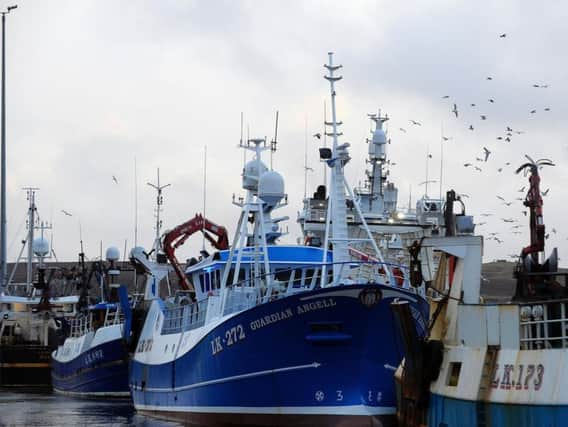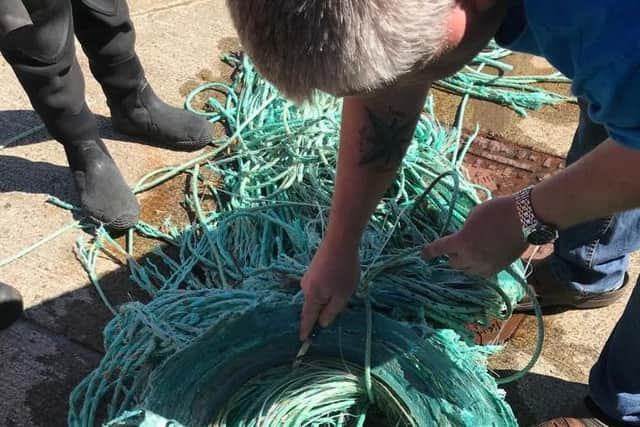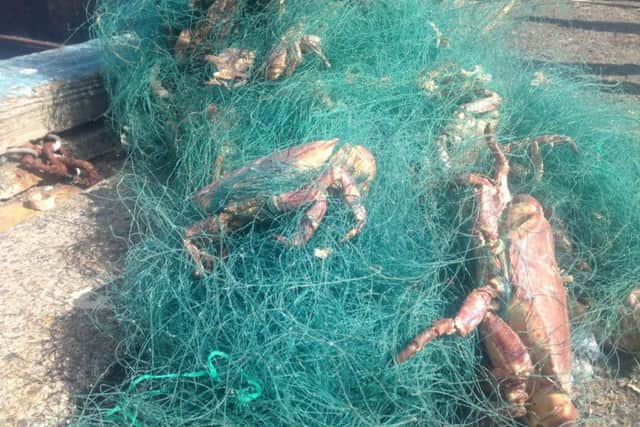Shetland fishermen call for curb on foreign boats using damaging methods in Scottish waters


Skippers in Shetland claim the local whitefish fleet and the marine environment are suffering due to a major rise in the number of gill-netting and longline fishing boats coming into Scottish waters from overseas.
They say numbers around Shetland have doubled in the past two years, with boats working ever closer to the coastline and restricting access for other vessels - sometimes across hundreds of square miles.
Advertisement
Hide AdAdvertisement
Hide AdThe situation, which is legal under EU laws, has raised concern over the increasing amount of lost gear entering the ocean, where it poses a major threat to marine wildlife and can cause damage to boats.


The Shetland Fishermen’s Association (SFA) has reported scores of local boats hauling up fine mesh twine in their own nets, while others have had to abandon work and return to port for costly repairs after entanglement.
“At a time when the public is rightly concerned about the amount of plastic dumped in the sea it is particularly galling for our skippers to be forced off local fishing grounds by vessels that leave so much rubbish behind them,” said Simon Collins, executive officer for the SFA.
“We urge the Scottish government to regulate these vessels’ access to our waters as soon as it can do so once we leave the Common Fisheries Policy, as part of the normal cycle of negotiations between coastal states.
“In the meantime we need the authorities to use the powers they do have to limit the damage.”


Fishing is one of Shetland’s key industries, worth nearly £70 million a year.
Gill nets and longline gear are no longer used by Scottish crews as they are considered less environmentally friendly than other methods.
The local fleet - around 20 vessels - is made up of mainly trawlers and seine netters, with a similar number of longliners and gill-netters coming in from overseas.
Advertisement
Hide AdAdvertisement
Hide AdJames Anderson, skipper of the Alison Kay, said: “We’ve been fishing here for the last 10 years, but this year there was a line of three boats with enough nets to cover the whole area.
“All in all there were 10 German-flagged Spanish boats with no track record of fishing here, taking up, I reckon, 200 square miles.
“In years gone by they may have been here but there were fewer of them and they were much further out, much deeper. They’re aggressive too, telling us: ‘This is the area we fish, keep clear for 90 days.’
“We’ve lost a lot of fishing because of this, and because they leave the gear we get caught in it and have to haul it up. It’s fine mesh plastic, a right mess.
“The Icelandic and Norwegian governments have severely limited this type of fishing, and it’s about time the UK and Scottish governments did so too.”
Mr Collins says the situation is sparking run-ins between the fleets.
Nick Underdown, from sustainable fisheries campaign group Open Seas, says conflict at sea is always “bad news” and highlights the need for better management.
He added: “Our environment is the major victim, whether it’s ghost fishing from set nets or damage to the seabed by bottom-trawling.
Advertisement
Hide AdAdvertisement
Hide Ad“It exposes the urgent need for improved management that allocates fishing opportunity preferentially to the most sustainable fishing methods.
“Leaving fishermen to sort things out for themselves is no way to run a sustainable fishery and unfairly penalises those who are fishing legally and following good practice.”
A gill net acts like a giant curtain around a huge area of the seabed, catching anything within its boundary.
The nets are often left in place for up to three months, effectively fencing off huge swathes of a fishing ground.
Longlining is a slow-capture form of fishing involving a single line hung with hundreds - or even thousands - of baited hooks.
Without careful management the method can unintentionally capture non-target fish, seabirds and other marine life such as sharks, which are attracted to the bait.
A spokesman for the Scottish Government said: “We use a range of resources, including our network of coastal offices and experienced compliance officers, to manage the monitoring of vessels, and aircraft to investigate and enforce compliance.
“Scotland continues to lead the way in protecting our marine environments and we are committed to improving monitoring and tracking technologies as outlined in the Programme for Government.
“In the event of an EU exit, our relationship with fleets of differing nationalities will be considered by negotiators.”